by Ravi Chandra, M.D.
March 15, 2012
The torch was passed and a fire lit on Wednesday night in the Castro Theater. Yes, we saw an extraordinary film about and performance by the incomparable Jake Shimabukuro; but we also witnessed a ritual uncommon in this cynical age – a gathering of families to bless the young, and to receive musical and cinematic blessings from the new bearers of hope.
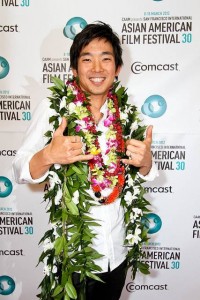
Like President Obama, Jake was named a Keiki O’ Ka ‘Aina, a child of the Island, and he brought his aloha spirit like a ukulele hero, a humble Hawai’ian Superman with a tender heart of gold, quicksilver hands and a ready smile. Japanese American, child of immigrants to the island, yet part of Hawai’i and one of its chief musical messengers, Jake also embodies what Supervisor Jane Kim called “San Francisco values”. Kim highlighted “the role that arts and artists play in building and advocating for community”. She said Jake exemplified the artist “who cares and has a conscience”, who shows his love through free shows for youth and seniors, including those devastated by the 2011 earthquake and tsunami in Japan. He seems the ideal “Mu Artist”, named for my friends at Mu Performing Arts in Minneapolis – “mu” (moo) being the Korean pronunciation of the Chinese character for the shaman/artist/warrior who connects heaven and earth through the tree of life. Through his Music is Good Medicine program (http://jakeshimabukuro.com/
The Director of Pacific Islanders in Communication, Ruth Bolan, reminded us of those values as well, saying the ocean between us connects and doesn’t divide us, just as our differences “unite us and make us stronger.”
I can only imagine the joy and pride of the parents in the Theater – Bob Nakamura and Karen Ishizuka, pioneers and founding heros of Asian American film and parents of Tad; and Carol Shimabukuro, mother of Jake and Bruce, who raised them as a single mom working two jobs. She says in the film that Jake, watching her shake tip money out of her purse night after night, said “someday, Mom, I’m going to take care of you.” “That’s so sweet, so touching – but I never thought it was gonna come true!” From the parents’ hands come gifts of love, history, music, and film – and from the children’s hands those gifts come to all of us, amplified and resonant. Individual achievement and hard work become pillars of community and beacons for hard times.
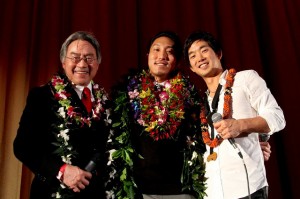
I was captured immediately by the artistry of Tad Nakamura’s film. We move from Jake practicing ukulele in a dressing room, to his playing to a packed theater, and then to playing in front of children – perfectly encapsulating the way that his music comes from a personal to public and neighborhood spaces. The film was born in a personal way as well, when Producer Don Young was at home in 2010 with a sick daughter, and had some time to research Jake’s music online. He found that while there was a lot of press coverage, there was no thorough or complete representation of Jake’s story. He got the go-ahead from Stephen Gong, contacted Jake’s publicist, and flew out right away to Honolulu to meet with Jake to propose the collaboration. Tad Nakamura was the clear choice for director, with a trio of films about the Asian American and Japanese American experience under his belt (PILGRIMAGE, A SONG FOR OURSELVES and YELLOW BROTHERHOOD). But this was Tad’s first feature-length documentary, and it sounds like it was a challenge to “present someone the way you see them. I got to know Jake over two years – how do you portray (in one hour) the person you got to know over two years?” While it was mentioned that Tad continues to tinker with the film – “until he’s locked out of the editing room,” as Jake said – it was clear by the audience’s reaction that he and everyone who’s worked on the film have powerfully succeeded in crafting an elegant and beautiful portrait of a young but already highly accomplished artist.
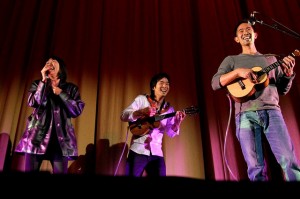
Jake was deeply moved by the film and evening as well – he spoke of being on the road for 9 months of the year and hardly seeing his family. Being reunited with them in San Francisco and seeing the last two years of his life and his life story on the big screen brought him to tears, probably in part because the film reminds him (and us) of the journey and all the people who were involved in it. Jake took all that heart and poured it out for us on stage, beginning appropriately with “While my Guitar Gently Weeps”, and moving to the classic “Akaka Falls”, paying homage to Western and Pacific traditions. He followed with his own composition “Blue Roses Falling”, before inviting Dominic “The Dominator” Pieranunzio (http://dominator.ukeland.com/
Jake’s younger brother Bruce (“my son”, as Jake joked) then joined him for a “Wipeout” duet. Bruce is apparently the jokester in the family, saying that after the film, “I feel like I know Jake better than I ever did!” Later, the boys backed up their mother Carol, who sang a classic Hawai’ian melody. Bruce quipped, “Jake’s been all over the world – but he always gives his family their three minutes of fame!” He also said, “huh, all this time, I thought this film was gonna be about me!” “Bohemian Rhapsody” closed out the performance. No, Jake – we will not let you go, go, go, go.
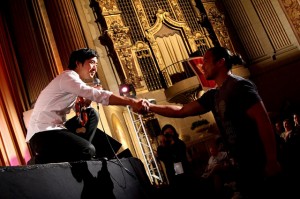
During the Q and A, Joel, a young musician whose interest in music was waning, asked Jake for advice. Jake got down on his knees to listen to the question, and ask Joel’s name. He then spoke eloquently about music and life as emotional journeys. (I paraphrase.) “Music is called the universal language, but I think it’s really the language of the universe. It’s the purest and most honest form of communication. We have filters on speech, but music is pure emotion. Whether you are experiencing relationships with family, friends or the universe, we have the desire to express who we are. Tad hasn’t slept in two weeks because he was trying to express something through film…The instrument is the illusion. Before you play a chord, it happens in here,” Jake said, gesturing to his heart. “It’s about stimulating emotion – the more you can feel, the more you can grasp – the more you can express. My advice is just to go out and experience life. Music is not about playing scales. It’s about feeling. You have to feel life.”
With that, Jake Shimabukuro, Doctor of Aloha, cured us all of post-Tiger Mom trauma.
We left and wandered the streets, satisfied, but hungry for more.
Photos from the SFIAAFF30 Premiere of Jake Shimabukuro: Life on Four Strings
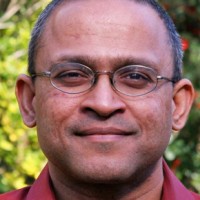 Ravi Chandra, M.D. is a psychiatrist and writer in San Francisco. You can find more of his writing and spoken word performances at www.RaviChandraMD.com. His blog for Psychology Today, The Pacific Heart, is here http://www.psychologytoday.
Ravi Chandra, M.D. is a psychiatrist and writer in San Francisco. You can find more of his writing and spoken word performances at www.RaviChandraMD.com. His blog for Psychology Today, The Pacific Heart, is here http://www.psychologytoday.
Follow him on Twitter at https://twitter.com/





Great article Ravi. You touched on everything that made it a special night and experience for me.
Thank You, Ravi for sharing this. Y
Jake-I know u r maried-so am I-but I have the biggest crush on u! You are so cute and sweet and your music is just awesome.After hearing u I went out and bought a uke-just one more in the world-like u say”If everybody played a ukele………….Love,Teresa (NC)